The 9 Grahas (Planets)
Jyotish or Vedic Astrology uses 9 Grahas (planets) in the chart analysis:
The Sanskrit word "Graha" is often taken as the equivalent of the English word planet. This is a very simplistic translation which hides the deeper meaning of this word. "Graha" refers to an entity that has the power to "seize, lay hold of, or grasp". Therefore, Graha means “to grasp” meaning the planets possess, or take hold of us. This meaning is intimately related to the meaning of the nakshatras (also called lunar mansions, or a 27-fold division of the zodiac), which are described in similar terms.
Graha therefore goes beyond the word planet and describes the ability of celestial events to either influence or predict occurrences on earth. This aspect is the fundamental reason that astrology is not accepted by the scientific community, as this connection has no known physical basis. Dr.Theja prefers to use the word “Graha” instead of planet because it conveys this deeper meaning. Besides, using the word planet would not be technically correct. The nine Grahas (“Planets”) are called Surya / Ravi (the Sun), Chandra / Sandu (the Moon), Mangal / Kuja (Mars), Budha (Mercury), Guru / Brahpathi (Jupiter), Shukra / Sikuru (Venus), Shani / Senasuru (Saturn), Rahu (Northern lunar node and Ketu (Southern lunar node). The Sun is not a planet, it is a star. Rahu and Ketu are not planets, and indeed do not even represent physical entities.
The Grahas are divided into two groups, according to their general auspicious and inauspicious nature. The Sanskrit terms used to name these two groups are “Saumya” or benefic and “Krura" or malefic. The Waxing Moon, Mercury, Jupiter and Venus are known as benefices. The Sun, Saturn, Mars, Waning Moon, Rahu and Ketu are classified as malefic.
The nine planets (seven planets and the lunar nodes) have specific meanings, and significations. The planetary rays manifest in various ways in our lives. A planet rules each life experience and different stages of our lives. They are the key indicators of people and different attributes or qualities we have. Understanding the true significations of the planets in our lives will bring a higher consciousness, releasing us from their grasp or hold on us.
Rahu, Ketu, and the Planets influence each other in various ways. The ancient sages saw a relationship between the movement of the planets and the ups and downs of human experience. Vedic Astrology explores these variations in order to help us anticipate challenges and comprehend their meaning.
Two planets in the same sign are conjunct. Planets in sign opposition are said to aspect each other. Mars, Jupiter and Saturn have special additional aspects. The sign in which a planet is located is of great importance. If the sign is favourable to the planet, the qualities of the planet are expressed more strongly and auspiciously. The person in question will enjoy more benefits in different areas of life that are signified by the planets. Contrary, if the sign is very unfavourable, the planet will turn inauspicious and may bring problems and struggle in whatever area of life it represents.
Dr. Theja calculates all of these influences and many more. He has the ability to calculate and analyse all of the complex influences of the planets and then present them to you in ordinary language (Interpretations).
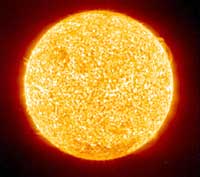
The Sun is the centre of the Solar System of planets used in Vedic Astrology. Therefore the Sun rules all types of central things such as the central government, the centrally powerful person in an organization, and so forth. In ourselves, the Sun rules our centre, which is our soul. The Sun is the source of light for all other planets and beings, so the Sun rules in astrology our centre of energy. As the source of energy in the Universe, so from the Sun's placement in our charts we judge our level of energy.
The Sun represents the soul, the ego and the body of the individual, and therefore its placement is of great importance. The Sun is best placed in Mesha (Aries) where it is called exalted. Opposite from there, in Tula (Libra) it is least auspicious and called debilitated. The sun is Lord of the sign Simha (Leo) and also of the house where Simha is located.
Sun signifies: Atma-Self, masculine, future, soul, physical body and health, heart,
life force, courage, ambitions, pride, dignity, ego, vitality, will power, stamina, sense of self, power, fame, life, health, sovereignty and clothes, glory, inspiration, creativity, leadership, Father, teachers, authority, law and order, bosses, political leader, Kings or Presidents. It has anger but momentary. It’s element is gold. East is represented by sun.
Medical Astrology: Heart, blindness, baldness, right eye, headaches
Gemstone: Ruby, Red Garnet
Day: Sunday
Rules: Leo Exaltation: Aries Debilitation: Libra
Directional Strength: Tenth House
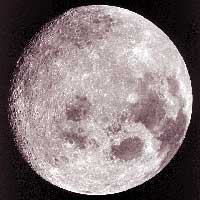
The Moon is close to us, and reflects the light of the Sun. The Moon is the most visible planet of all, to us here on Earth, because we can look at it so easily. It neither burns our eyes, nor hides in the deep darkness of space, like the others. Rather, the Moon is up close and personal, showing herself fully to us. The Moon is indeed very dear, close, and friendly. It's light is very nice and pleasing. Her full bodily lustre each month is a rising sight to see. Unlike Western Astrology where the Sun is most important, in Jyotish the Moon is the first “Graha” to look at and plays a central role in many calculations and predictive techniques.
The Moon rules the mind, the emotions, feelings, nursing, nurturing, mothering and the overall life of the person. An afflicted Moon greatly shapes the personality in the direction of the affliction, whether it is harshness of character, sadness of mind, or an angry and aggressive nature. Similarly, benefic influences upon the Moon in a chart, or a well placed Moon we could also say, bestows the reflections of helpfulness, peace of mind, cleanliness all around, and so forth.
The Moon is best placed in the first few degrees of Vrishabha (Taurus) where it is called exalted. Opposite from there, in Vrishika (Scorpio) it is least auspicious and called debilitated. The Moon is lord of the sign Katrka (Cancer) and also of the house where Cancer is located.
Moon signifies: It is a cold, calm and quiet planet and represents mind, reflective, feminine, night, emotions, sensitivity, nurturing, security, past, past-lives, patterns of behaviour, receptivity, caring for others, heredity, Mother, motherland, the public or masses, popularity, inner contentment, money, general well-being, home, water, habits, subconscious mind, growth in early childhood, fertility, breast, menstrual cycle, eyes, lungs, liquids and nurses. Direction north-east, element is silver.
Medical Astrology: Breast, stomach, watery disturbances, edema, phlegm, left eye
Gemstone: Pearls, Moonstone
Day: Monday
Rules: Cancer Exaltation: Taurus Debilitation: Scorpio
Directional Strength: Fourth House
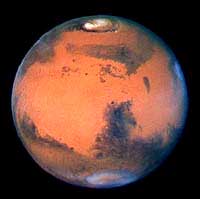
Mars is the Ksatriya of the Gods, meaning the warrior. Mars rules aggression, weapons, enforcement of law, emergencies, urgencies, weapons, energy, suddenness, rashness, anger, the colour Red, and related items and matters.
There are points in all of us when we apply our energy and quickness, usually to prevent a disaster, or to save a situation. For example, we move quickly to catch a falling glass object. Mars likes to protect- we race to save a child from running into the street. If somebody is hurt, we hurry to the scene. Mars people are often involved in causing bleeding with their weapons or stopping bleeding with their medical equipment. The gun of the soldier kills some and saves others. It's good to be on the right side of a person under the influence of Mars. A weak Mars makes one easily tired, jittery, easily angered, and reactive. Mars aspects 3 signs, the 4th, 7th and 8th signs from its own position.
Mars represents the energy, stamina and brothers of the individual. If well placed, it brings strength and focussed energy, if poorly placed accidents and injuries. Mars is best placed in Makara (Capricorn) where it is called exalted. Opposite from there, in Katrka (Cancer) it is least auspicious and called debilitated. Mars is lord of the sign Mesha (Aries) and Vrischika (Scorpio) and also of the houses where these signs are located.
Mars signifies: Energy, action, passions, male influence, courage, strength, motivations, anger, violence, determination, aggression, bluntness and boldness, injury, accidents, war, chemists, fire, anger, surgery, initiative, motivation, courage, technical or mechanical ability, sports - athletic, military figures, police, fires, physical strength, operations, , muscles, blood, sexual vitality, weapons, machines, conflict, can inflict death, fire, selfish, criminal, goal oriented action, self-righteousness, land, property and real-estate, brothers, enemies, science, instruments, guns, knives. Its element is copper. Its colour is red and direction south.
Medical Astrology: Blood, head, injuries, accidents, bleeding, headaches, high fevers, inflammation, surgery, burns
Gems: Red Coral
Day: Tuesday
Rules: Aries and Scorpio Exaltation: Capricorn Debilitation: Cancer
Directional Strength: Tenth House
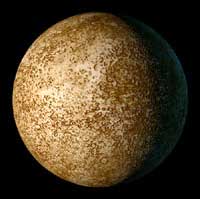
Mercury is youthful and causes youthfulness or immaturity in the chart in the house it resides. Mercury is the negotiator, so it rules in us the ability to be diplomats, negotiators, deal-makers, or good liars. Mercury rules all types of communications, spoken and written. A good Mercury in a chart makes for careers where speaking, studying, thinking, writing and other scholarly thinking related matters are necessary. A bad Mercury can work towards making a person dumb or odd in mental workings.
Mercury, being youthful, is neither mature nor convinced about anything for certain. He is truly a gullible boy, so, he is easily influenced by other planets. Any planet with Mercury will influence him. So Mercury is called "mutable" or "changeable". This reflects in the chart very much. Mercury always stands for the thinking capacity in a person, which in Sanskrit would be called your "Buddhi" or "intelligence". Mercury's Sanskrit name is therefore "Budha", which also means "the intelligence".
Mercury represents the speech, intellect and friends of the individual. It is a very, adaptable and curious planet. If afflicted, it gives speech problems and a poor discriminative ability. If well placed it makes a person witty, easy going and skilful. Mercury is best placed in Kanya (Virgo) where it is called exalted. Opposite from there, in Meena (Pisces) it is least auspicious and called debilitated. Mercury is lord of the sign Kanya (Virgo) and Mithuna (Gemini) and also of the houses where these signs are placed. Its element is bronze and the colour is green and direction north.
Mercury signifies: Mercury is talkative and tactful, but not harmful. It is a good trader, mathematician, editor and publisher. It has excellent argumentative and analytical power and mind. Intelligence, wisdom, speech, education, matters relating to communication such as speech and writing, humour, trade, commerce, sales, education, ideas, thoughts, school, analytical and rational mind, cognitive intelligence, sense of humour, youth, trickster, truth, telephones, television, computers, travel especially short distances, childhood, aunts and uncles, neighbours, adaptability, twins, astrology, nervous system. It represents memory, throat, arms, maternal uncles.
Medical Astrology: Lungs, hands, arms, nervous system
Gemstone: Emerald, Green Tourmaline
Day: Wednesday
Rules: Gemini and Virgo Exaltation: Virgo Debilitation: Pisces
Directional Strength: First House
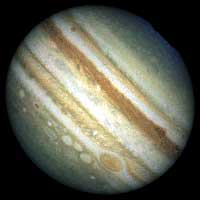
Jupiter is the "Guru of the Gods". Jupiter is called "Guru" in Sanskrit. Guru means "teacher" because he is "heavy with knowledge". Jupiter is also called Brihaspati (bree-haws-putt-tee). Brihaspati is the name of the Guru of all the demigods in the higher planets. He is the advisor, or teacher, of the demigods.
A good Jupiter in a chart which leans towards Jupiter in a positive way will grant good relations with Priests, Law, Higher Education, the Legal system, the Financiers of the world, and so on. Jupiter encourages righteousness when he is strong.
Jupiter is a large planet, and so rules largeness in things. Jupiter tends to expand things. Wherever he sits and wherever he aspects in a chart will tend to grow based on Jupiter’s influence. For example, if Jupiter affects the Lagna, which rules the body, then the body will tend to be large, or fatty. When a good Jupiter affects house ruling money then the money will tend to grow. Jupiter in the second house or third, which rules speaking, will tend to make the person speak often, and with a tone of divine advice, one of Jupiter’s other natural tendencies.
Gurus and advisers are always well wishers, so Jupiter is very giving or kind, and is known as a great giver or granter of fortune. Jupiter is considered the most benefic planet, because of his nature of always wanting to give and grant benedictions. Because children are an expansion of life in many ways, as well as a gift from God, Jupiter rules children. Because Jupiter represents God through his many advices he has a tendency to be related to the ninth house, which rules God in our lives.
Jupiter represents knowledge, wisdom and the offspring of the individual. It is a planet of expansion, growth and good fortune. Jupiter is best placed in Katrka (Cancer) where is called exalted. Opposite from there, in Makara (Capricorn) it is least auspicious and called debilitated. Jupiter is lord of the signs Dhanus (Sagittarius) and Meena (Pisces) and also of the house where these sign are located. Jupiter aspects 3 signs, the 5th, 7th and 9th signs from its own position.
Jupiter signifies: Spiritual teacher, guide, truth, religion, philosophy, spirituality, grace, law, the great benefic, fortune, wealth, expansion, higher education like colleges, optimism, generous, joy, luck, self-indulgent, excessive, faith, children, money, husband in a females chart, long distance travel
Medical Astrology: Liver, hips, overweight, edema, high cholesterol, growths such as tumors
Gem: Yellow Sapphire, Yellow Topaz, Citrine
Day: Thursday
Rules: Sagittarius and Pisces Exaltation: Cancer Debilitation: Capricorn
Directional Strength: First House
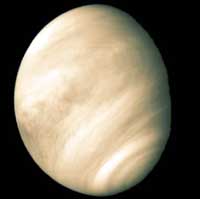
Venus is called Shukra in Sanskrit. Shukra literally means "semen", but more generally means "refined things". Venus rules over all types of refined things that are desirable such as art, music, flowers, love, beauty, etc. A well placed Venus in a chart that is well disposed towards Venus will grant to the person a life full of "the good things" such as those things mentioned above.
The Vedic way of understanding of life, and the process of elevation, is such that addiction to material gratifications are known to be often "an-arthas" or "unnecessary". Too much stress is laid upon material gratifications in ungodly societies. So, Venus is loved and followed when the person or society is of the materialistic type. For Westerners, a good Venus is considered a good thing, because it helps in bringing in material wealth, sense gratifications, and all types of material fortunes. Famous, rich and beautiful people often have strong Venus, as these blessings are highly desirable to the materialistic masses, who love to worship such "achievements" in life. People in general are much more interested in the "Lives of the Rich and Famous" than they are in the "Lives of the Intelligent and Devoted".
While Jupiter tends to give advice leading to surrender to higher principles, Venus gives advice which works for us in the here and now. Jupiter is more about dharma, or religion for higher principles, whereas Venus is more about a-dharma, or self serving ways. The entire Vedic principle is to surrender to the greater laws of God, whereas Venus teaches us to maximize things as they are now, for ourselves. But it is not that one is bad and one is good- it's that priority has been established correctly. It is not wrong to have material quality in our lives, or pleasures and enjoyments, but they should not direct us and dictate our actions when higher principles of goodness are at stake.
Venus represents the enjoyment, taste, sexuality and relationships of the individual. It can give a person a great sense of aesthetics and very pleasant personality, or sensual and tasteless, dependant on how well it is placed in the chart. Venus is best placed in Meena (Pisces) where is called exalted. Opposite from there, in Kanya (Virgo) it is least auspicious and called debilitated. Venus is lord of the sign Vrishabha (Taurus) and also of Tula(Libra) and of the houses where these signs are located.
Venus signifies: The feminine spirit, beauty, grace, charm, refinement, luxuries, wealth, sensuality, vanity, charisma, glamour, good taste, sexual attraction, elegance, comforts, arts, music, theatre, love, wife in a males chart, pleasure of the senses, sugar, affections, conveyances, flowers.
Medical Astrology: Reproductive system, bladder, kidneys, and pancreas -diabetes
Gemstone: Diamond, White Sapphire, Clear quartz crystal
Day: Friday
Rules: Taurus and Libra Exaltation: Pisces Debilitation: Virgo
Directional Strength: Fourth House
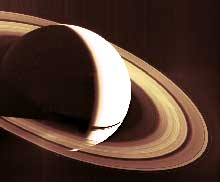
Saturn is known for his ring. Saturn rules restrictions- or things that surround us on all sides. All types of blocks, restrictions and obstacles are the ruling lot of Saturn. The wedding ring is related to Saturn, because it represents a restriction that prevents certain types of actions- namely, courting other spouses and therefore the ring is a symbol of a block or restriction.
Saturn is the outermost planet in the Vedic scheme of things, and so has "the last laugh". Saturn is final, being the last one. Saturn rules all types of final things, or things which are insurmountable. Saturn is "the bottom line" in many ways. Therefore, Saturn rules Death as well as Unconquerable Time. All things decay in time, and Saturn rules this decay, or the effects of old age. Saturn is old, and low, the worker, the downtrodden, and the dirty.
Saturn rules the colours Navy blue and black, which are akin to seriousness, coldness, and finality. Things turn dark when they are dead, when the colour of life has gone out. The sky is either blue or black because the distance we are looking at when we look at the sky is always insurmountable, being such a far distance. When we look across the land the trees in the distance are more "greyed out" than the closer trees, because that distance, being insurmountable, takes on the dulling effects of Saturn. If something is hazy or unclear, it is because it is "out of reach" and that is Saturn again.
When Saturn affects a house or planet in a chart, then it "shuts it down" to some degree, by means of its strong oppressing power. Saturn has the ability to oppress anything. When it aspects the Moon, or Mind, then the person feels the effects of Saturn in their mind, which basically leads to depression.
Saturn is large and slow, and so it rules these things. Large slow things cause a lot of pressure, and so does Saturn. When Saturn affects something, it slows it down, puts it under pressure, and ultimately crushes it under its tremendous weight and restrictive power. On the good side, these things give it rule over focus. Focus is a funny thing- it means application of pressure for a certain goal. Saturn can make things it affects highly focused or controlled, which at times is a very good quality.
Because of all these things, Saturn is considered a "first class malefic", or in other words, a planet capable of doing great harm. But that is spoken from the angle of vision of the materially oriented. Materially speaking Saturn is usually malefic, except when his reduction and crushing capacity is used, in the chart, against the enemies of our material progress. For example, if Saturn is situated in such a way as to crush the twelfth house, or the house of losses, then our losses are crushed, which means we don't lose as much.
But Saturn has another good side. Consider the diamond- it is created from black coal under great pressure for a long time. Saturn rules coal, pressure, and long periods of time. So, Saturn creates the diamond, which is very beautiful and extremely hard. When a person is under Saturn, they eventually become beautiful and hard, or shining and strong. The trials and struggles that Saturn puts us through teach us hard lessons.
Therefore Saturn rules the side of the religious peoples which is strong in principal, unbending, renounced from material motivations, and so forth. Saturn has a lot to do with the dark blue colour worn by most Police officers, and the black worn by many Priests. Men often wear dark suits to do business, because it promotes a no-nonsense, dead-serious demeanour in their business dealings.
Saturn rules the low workers or Shoodras, as we say in Sanskrit. This is because he rules all things low and difficult. Things which are cold, dark, hard and created under pressure are ruled by Saturn, so he rules many types of metal like iron and steal, as well as the tools of hard work. Because he is an old man, he rules old things.
Saturn is the slowest moving graha, and represents the more time related aspects in life: endurance, sense responsibility, hard work, longevity and reclusion. It is typically described as the bringer of grief and misery in life, but if it is auspiciously placed in a chart it will be one's best insurance against poverty. Saturn is best placed in Tula (Libra) where is called exalted. Opposite from there, in Mesha (Aries) it is least auspicious and called debilitated. Saturn is lord of the sign Makara (Capricorn) and Kumbha (Aquarius) also of the houses where these signs are located.
Saturn signifies: Discipline, order, structure, dependable, stability, separation, solitude, limitation, obstruction, poverty, death, disease, oppression, pessimistic, worry, fear, bad luck, old age, delays, retards things, concentration, paralysis, depression, stunted, deprivation, bondage, fixed assets, land, property, endurance and lasting, doubt, phobias, darkness, sorrow, longevity, detachment, decay
Medical Astrology: geriatrics, death, bones and teeth, osteoporosis, arthritis, degenerative diseases, dehydration, premature aging, cancer
Gem: Blue Sapphire, Amethyst
Day: Saturday
Rules: Capricorn and Aquarius Exaltation: Libra Debilitation: Aries
Directional Strength: Seventh House
Rahu (the Northern Lunar node)
Rahu is the point in the zodiac where the paths of the Sun and the Moon cross. If the Sun and Moon in their movement meet in this point, then an eclipse takes place. Eclipses "seize" the light of the Sun or the Moon, and it is this seizing quality that is characteristic for Rahu. Rahu is not an actual planet-ball, as the other planets are, but a point in space that is of great influence. The nodes Rahu and Ketu are always opposite each other in the Zodiac. They are calculated from the orbits of the Sun and Moon in relation to the Earth. They are gravitational line up points. They cause the Moon to actually wobble in it's orbit.
It is a scientific fact, that when the Moon gets close to the nodes in it's real orbit, that it wobbles due to the gravitational pull of the point. So, when in a chart we see that the person was born at a time when the Moon was close to one of the nodes (Rahu or Ketu) that the mind is disturbed, since the Moon rules the mind. This is a fact which you will see played out in the lives of those who have this. Since the nodes occupy two signs, roughly one sixth of the population has this. However, it is strongest when the Moon is really close to the Node it conjoins- or in other words, when the two are close by degrees within the sign- say within 5 degrees of each other. Then the effects become pronounced.
Rahu's nature is that of anger, upsetness, anxiety, suddenness and other things which we would feel if we got our heads cut off right when we were getting something we wanted. Think of it: Just when you are about to get what you always wanted, right then something comes to totally ruin your plans. But, the secret is this: Anyone who is killed by the weapon of Vishnu is also highly benefited spiritually, so this plays out in our lives as well. So, the effects of Rahu can be said like this: Painful and troublesome, but ultimately for a higher cause.
Rahu signifies: Fame, extremes, foreigners and foreign lands, fulfilment of worldly desires, status, prestige, power, worldly success, outer success with inner turmoil, obsessive, addictions, psychic, disturbances, collective trends, disturbances, poisons that destroy and heal, medicine, drugs and alcohol
Medical Astrology: Plagues, epidemics, possessions, manic depression, insanity, addictions,
hormonal imbalances, suicide, insomnia, hysteria, neurosis, nervous disorders, cancer
Gem: Hessonite Garnet (Gomehda)
Exaltation: Taurus Debilitation: Scorpio
Directional Strength: Tenth House
Ketu (The southern lunar node)
Ketu is not really a planet, but rather a mathematically calculated point in the heavens. Because of its lack of a "body" it represents uncertain, unexpected and unpredictable phenomena. It is intelligent and relates to mathematics and other abstract knowledge.
Wherever Ketu sits in a chart there we will find the sucking black hole effect. It feels forever like a hole into which we tend to want to put more and more of that thing to satisfy it. We cannot get enough where Ketu sits- we feel the lack of that house in our lives very much. Therefore many say that Ketu rules separations, cuts, loses and deprivations.
For the spiritually minded Ketu is very good, and for the materialistic, very bad. It is good for the spiritually minded because it rules liberation from bondage. When Rahu's body was separated from his head, the body no longer was under the influence of Rahu's mind, and so was free. Ketu represents the ultimate freedom from ourselves, our spiritual liberation. Ketu is very final in this sense.
In Vedic thought, liberation, called "Mukti" or "Moksha" is considered the highest goal of life. After all our material role playing is through, we are to seek liberation from material bondage and misidentification, and seek out union with God (Yoga means union). So, liberation is the highest goal and Ketu is the "Moksha Karaka" or significator of Moksha in our charts.
When reading astrological books, one must remember that many of them were written, oddly enough, from the materialistic viewpoint. Indeed, today also, many people who are into astrology are into it for reasons of bettering their material positions, or finding out just how good their life (here on Earth) is going to be. Therefore, the books often say that Jupiter is the highest benefic. However, spiritually minded astrologers know that, in terms of real spiritual development, Saturn is above Jupiter and Ketu is above Saturn. Jupiter rules Wisdom, but Saturn rules Truth, yet Ketu rules Moksha, the highest achievement of all. So, Ketu is the most spiritual planet, with Saturn being next in line, and Jupiter takes third place.
Ketu signifies: Loss, liberation, perception, wisdom, lack of confidence, negation, self doubt, fantasies, confusion, indecision, illusions, drug addiction and alcoholism, psychic influences, fire, injury, death, spiritual insight
Medical Astrology: Psychic disorders, radiation diseases, cancer, surgery and malpractice
Gem: Cat’s Eye
Exaltation: Scorpio Debilitation: Taurus
Directional Strength: Twelfth House